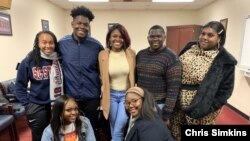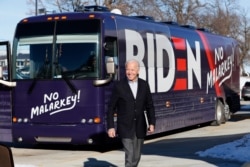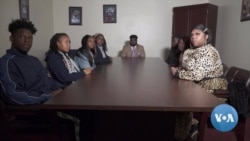At South Carolina State University, a historically black public institution of higher learning, some students shuttle between campus buildings, while others bury their faces in textbooks. Many of these African Americans students are focused on their studies, not the upcoming 2020 presidential election.
“A lot of our generation, a lot of my friends, say, 'I'm not going to vote because my vote doesn’t matter,'” said Kayla Hasty, a senior biology major from Ridgeland, South Carolina.
Hasty points to apathy among blacks who didn’t vote in the 2016 election. Now, she is encouraging young people between the ages of 18 to 34 to vote in South Carolina’s second-in-the-nation presidential primary contest on Feb. 29.
“So, instead of already feeling defeated, do something about it," she said. "Are you going to suffer for four more years of the same thing that you could have prevented had you (gone) and voted?"
Black voters make up about 25% of the Democratic electorate nationwide, however, they account for roughly two-thirds of the party's primary voters in South Carolina. As an early voting state, it can play a pivotal role in determining which Democratic candidate will win the nomination and face President Donald Trump next November.
“Whoever receives a large chunk of that black vote (in South Carolina) will have a much easier time" rallying black support elsewhere, said Willie Black, a political science professor at South Carolina State University. "I don't see any of the candidates in the current field matching the numbers that (2016 Democratic nominee) Hillary Clinton or (former President) Barack Obama did in receiving African American votes," he added.
Political analysts say voter participation among young blacks declines precipitously if there’s a lack of enthusiasm for the candidates — a phenomenon that could play out in South Carolina next year.
"I feel as though each candidate is just trying to beat the current president. They're not really trying to push off or present anything that's really attention-getting,” said Lamar Henry, who is studying to go to medical school.
Polls consistently have shown former Vice President Joe Biden leading the pack in South Carolina, with strong backing from the black community, which accounts for 27% of the state's population. Widely regarded as a moderate, Biden does particularly well among older African American voters. He struggles with progressives of all races, who tend to be younger.
"When we look within the party itself, the Democratic Party itself, you see that the vote is kind of fragmented," Black said. “You have Joe Biden leading the pack. South Carolina is his firewall, especially if Biden underperforms in Iowa and New Hampshire" — states with nominating contests ahead of South Carolina.
Several South Carolina State University students told VOA they were surprised African American contenders Cory Booker and Kamala Harris — both viewed as charismatic defenders of minorities — didn't win more support in the black community.
Harris, a California senator, dropped out of the presidential race in early December. Booker, a senator from New Jersey, continues to campaign but has drawn low single-digit support in nationwide polls.
So far, no candidate of color has qualified for the next Democratic presidential debate, to be held Dec. 19 in Los Angeles. Harris had qualified before exiting the race.
“I had an opportunity to meet Cory Booker," student Monique Daniel from Atlanta said. "I liked his message, but it is striking he hasn’t received a lot of support in the black community."
Black says African American Democrats, like many in the party, have one overriding goal.
"African American voters in total say their overwhelming issue that they all cling to is to find someone who can beat Donald Trump," he said.
Biden has around 35% of support among South Carolina Democrats, a 19-point advantage over his closest competitor, Massachusetts Sen. Elizabeth Warren. Analysts say Biden’s connection to Obama, America's first black president, is one of his biggest assets with African American voters here.
On campus, however, the picture is far from clear-cut.
“I really haven't been wowed by any candidate, including Joe Biden. I like some of his platform ideas. But it is not like I need to throw my support behind him right now," said Royal Clemonts, a junior, who wants lower health care costs and more student financial aid.
“There may be some variance in the African American vote," University of South Carolina political science professor Todd Shaw said. "I think some of that variance will probably be along the lines of age, that younger voters may be more inclined to vote for candidates a little bit more on the left or progressive. Therefore, (Vermont independent Sen.) Bernie Sanders or maybe Elizabeth Warren."
Support for Trump runs low on this predominantly black college campus. Alston Jenkins, a senior biology major, strongly believes Trump won the presidency in 2016 by exploiting race divisions.
WATCH: Young black voters prepare for election
“I've seen him promote white supremacy. It really encourages people to feel like they can go back to calling us (black people) whatever they want to say, and think how they want to about us. That's all I've seen from his presidency, and to build a wall promoting racism," Jenkins said.
Trump's policies and pronouncements repeatedly have spawned accusations of racism. And repeatedly, he has denied the charge. Earlier this year, he tweeted that his political opponents "always play the race card when they are unable to win with facts."
In October, Trump visited South Carolina's Benedict College, a historically black college in Columbia where he received a bipartisan justice award.
Anti-Trump sentiment is not universal among young African Americans. Candace Owens, an activist who promotes conservative ideology among black youth, attended a recent White House ceremony in which the president touted record-low black unemployment.
“We need to make sure we fight for President Trump. He’s the one man standing up for black America," Owens said.
Among the far larger cohort of young African Americans who oppose Trump, many say they have yet to pick a favorite Democratic candidate.
“I'm still undecided only because there's so many presidential candidates at the moment," said 18 year-old student Javonni Ayers. “I feel pressure to make the right choice."
Though undecided, many younger blacks know much is at stake for them and the nation as a whole in next year's elections. At a student gathering on campus, Javonni Ayers, who will be voting for the first time, urged her classmates to turn complaints about the status quo into action.
“If we get out and vote, we can make a difference in this election," she said.









